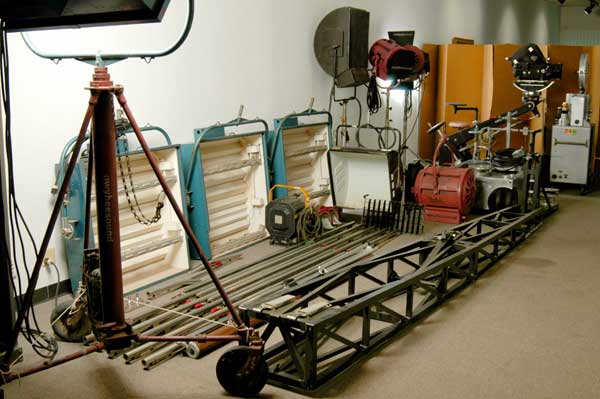Cinema Production Equipment
There is lots of equipment that is used to create motion pictures. Some of the main tools are cameras, lights, sound recorders. Some of the equipment that is just as important but often overlooked are things like camera-support, dollies, travel cases, lighting accessories, atmosphere effects devices, monitoring equipment, and more...
Cameras
Though High Definition video cameras are often talked about 35 mm motion picture cameras are the industry standard for cinema production, but 16 mm cameras are often used and with modern film stocks 16 mm cameras can produce images far more favorable to the best high definition systems.
Camera Support
Small cameras can be hand held but most often cameras are mounted on some kind of support. This support is usually a tripod but some cameras are mounted directly to a dolly or a crane. A support head is the device mounted between the camera and the support. The head allows for movement in both the vertical (pan) and horizontal (tilt) directions. The most common types of heads are friction heads, like a Mitchell Friction head and fluid heads. Large cameras or cameras in large blimps require special camera support. A Worralll geared head is a traditional head for large heavy cameras. This type of head requires a fair amount of experience to operate quickly but is great for precise and smooth control and for repeatable pans and tilts. Animators also find this head useful for creating pans and tilts that would be unachievable in animation with any other head even the best fluid head. The Worrall is very heavy, it is over 70lbs. This type of head is often mounted on a small crane, like a Mathews Tulip crane or a Meccanica crane, or studio dolly like a Fearless Panorama or a McAlister Hydraulic dolly. Like the geared head the cradle head is a type of camera-centered nodal head. But unlike the geared head a Houston Fearless head can simply be moved with a handle.
Lights
Lights can be categorized into two main groups: fixture types and globe types. The fixture is the housing, the lens (if the fixture has one) the various controls that the light may have, mounting hardware, etc. The globe is the actual light bulb. Popular fixture types are Fresnels, and Open face Pars. There are of course many subcategorizes of these lights and a few other unique specialty types of lights. The four most used globes are Tungsten, HMI, Florescent, and Carbon Arc. Carbon Arc, is not really a globe at all but an open electrical spark that emits a great deal of light and is used only on the largest movie productions. Tungsten are the most widely used and come in a wide range of sizes. HMI are a arc light like the carbon arc but the HMI arc occurs in a sealed glass envelope (a globe). These lights are widely used in professional movie productions because they somewhat mimic the light of the sun. Florescent lights used for movie production are similar to Florescent lights used in offices or homes but are specially made to work with motion picture cameras. Popular professional brands of lights and lighting equipment are Mole Richardson, Bardwell & McAlister, Matthew's, LuxArc, Arri, Lowell, Colortran, and Kinoflo.
Production Vehicle
Often production may occur at some location other than a set. In these instances the equipment normally found in a studio must be transported to the filming location. The grip truck transports equipment which may include lighting and camera dolly equipment. For a given production there may also be a camera truck, a electric/lighting truck, and even a crane truck.
Sound Recorders
To record sound for a movie a recorder, microphone, headphones, microphone boom, and all the connecting cables are required. Recorders used for movie production are different than the type used in music studios. They are required to either run at a precisely controlled speed or are required to record a synchronous signal from the camera. The microphones used generally have a very directional pickup pattern. This is to reduce other noises that are common on sets or filming locations. Most of the rest of the equipment used for movie production is similar to that used in a studio.
Post Production
After a film has been shot the image and the sound captured must be synchronized and and edited. Titles, and music are added and sometimes special effects are added to the production image during post production.

